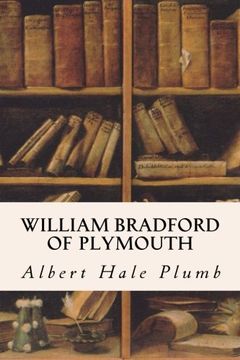Synopsis "William Bradford of Plymouth (in English)"
William Bradford of Plymouth is a classic William Bradford biography by Albert Hale Plumb. William Bradford (c. 19 March 1590 – May 9, 1657) was an English Separatist originally from the West Riding of Yorkshire. He moved to Leiden in Holland in order to escape persecution from King James I of England, and then emigrated to the Plymouth Colony on the Mayflower in 1620. He was a signatory to the Mayflower Compact and went on to serve as Governor of the Plymouth Colony intermittently for about 30 years between 1621 and 1657. His journal of Plymouth Plantation covered the years from 1620 to 1657 in Plymouth. When Bradford was 12 years old, a friend invited him to hear the Rev. Richard Clyfton preach 10 miles away in All Saints' Church that is located in Babworth. Clyfton believed that the Church of England ought to eliminate all vestiges of Roman Catholic practices, and that this would result in a purer Christian church. Bradford was inspired by his preaching and continued to attend his sermons, even though he was forbidden by his uncles.[10] During one meeting, Bradford met William Brewster, a bailiff and postmaster[11] who lived at Scrooby manor, four miles from Austerfield. During frequent visits, Bradford borrowed books from him, and Brewster regaled him with stories of the efforts toward church reform taking place throughout England.[11] King James I came to the English throne in 1603, declaring that he would put an end to church reform movements and deal harshly with radical critics of the Church of England. By 1607, secret meetings were being held at Scrooby Manor and about 50 reform-minded individuals began to worship together, led by Richard Clyfton and the Rev John Robinson. This group decided that reform of the Church of England was hopeless and they would sever all ties. Their weekly meetings eventually attracted the attention of the Archbishop of York, and many members of the congregation were arrested in 1607. Brewster was found guilty of being "disobedient in matters of religion" and was fined. Some members were imprisoned and others were watched "night and day", according to Bradford, by those loyal to the archbishop. Adding to their concerns, the Scrooby congregation learned that other dissenters in London had been imprisoned and left to starve. The Scrooby congregation decided in 1607 to leave England unlawfully for the Dutch Republic where religious freedom was permitted, and Bradford determined to go with them. The group encountered several major setbacks when trying to leave England, most notably their betrayal by an English sea captain who had agreed to carry them to the Netherlands, but instead turned them over to the authorities.[14] Most of the congregation were imprisoned for a short time after this failed attempt, including Bradford.[15] By the summer of 1608, however, they managed to escape England in small groups and relocate to Leiden in the Dutch Republic. Bradford was 18. By 1617, the Scrooby congregation began to plan the establishment of their own colony in the Americas. The Separatists could practice religion as they pleased in the Dutch Republic, but they were troubled by the fact that their children were being influenced by Dutch customs and language, after nearly ten years in the Netherlands. Therefore, they commenced three years of difficult negotiations in England seeking permission to settle in the northern parts of the Colony of Virginia (which then extended north to the Hudson River).[23] The colonists also struggled to negotiate terms with a group of financial backers in London known as the Merchant Adventurers. By July 1620, Robert Cushman and John Carver had made the necessary arrangements, and approximately fifty Separatists departed Delftshaven on board the Speedwell.

